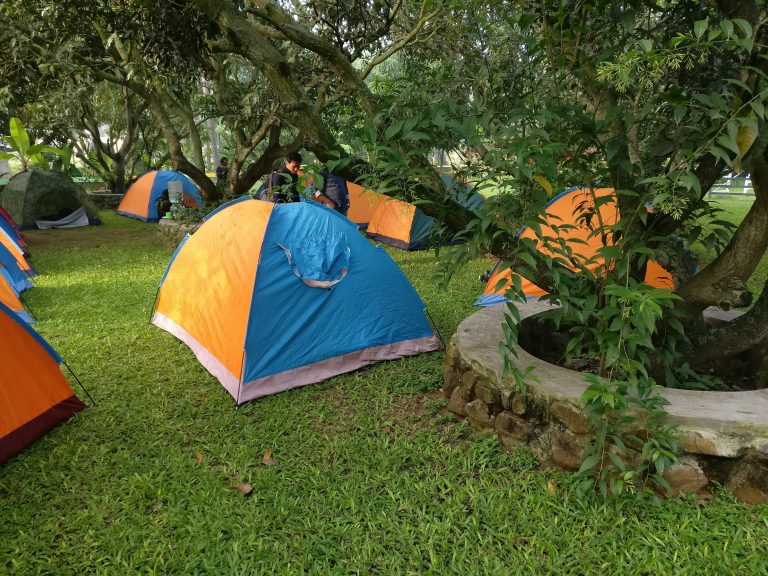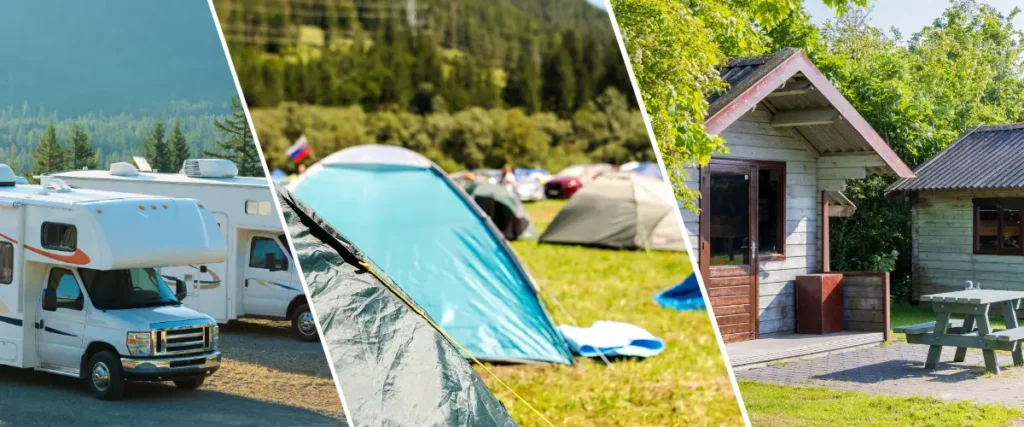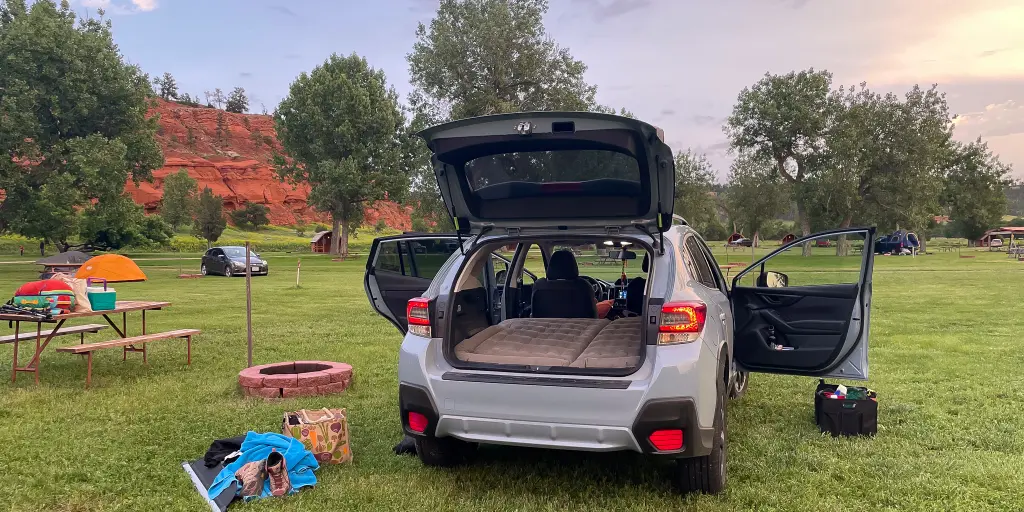Exploring the Great Outdoors: Understanding Different Types of Camping
Updated: 11 Oct 2024
64
Introduction
Understanding Different Types of Camping, Camping is one of the most popular outdoor activities worldwide, offering people a chance to reconnect with nature, break away from the hustle and bustle of daily life, and experience adventure in its purest form. However, for beginners or even seasoned campers looking to try something new, understanding different types of camping can be a bit daunting. What makes one style different from the other? Which type best suits your experience level or the kind of adventure you’re seeking?
This guide will break down everything you need to know about the various forms of camping. From traditional tent camping to the comfort of glamping, we’ll dive into the unique aspects of each style, helping you determine which experience aligns with your goals and preferences. By understanding different types of camping, you can make informed decisions about your next outdoor adventure, ensuring you have a safe, enjoyable, and unforgettable experience.
What Is Camping?

At its core, camping is a recreational activity that involves spending time outdoors, typically in a natural setting, with the primary purpose of immersing oneself in nature. While camping often involves sleeping in a tent, it can also encompass a wide variety of experiences, from rugged survivalist trips to luxurious stays in fully equipped outdoor accommodations. For those looking to explore the great outdoors, camping provides the perfect opportunity to reconnect with nature and enjoy the simplicity of life under the open sky.
Why Is Camping So Popular?
Camping appeals to a broad audience because it provides numerous benefits:
- Connection to Nature: Camping offers a chance to disconnect from technology and immerse oneself in the tranquility of the natural world.
- Affordability: Compared to many vacation options, camping is relatively inexpensive, especially if you have your own gear.
- Health Benefits: It promotes physical activity, whether through hiking, swimming, or simply setting up a campsite. Studies have shown that spending time outdoors can reduce stress and improve mental health.
- Social Experience: Camping is often done with family and friends, fostering a sense of community and bonding.
Understanding Different Types of Camping

There are several types of camping, each with its own unique approach to how you experience the outdoors. Let’s explore them in depth:
1. Tent Camping
Definition and Explanation
Tent camping is the most traditional form of camping and typically involves setting up a tent in a designated camping area or wilderness site. It can range from a primitive, backcountry experience to more structured environments like national parks with amenities such as restrooms and running water.
Essentials for Tent Camping
- Tent: Choose one that suits the size of your group and the weather conditions.
- Sleeping Bag and Sleeping Pad: Ensures warmth and comfort.
- Cooking Gear: Portable stoves, fuel, and cookware are necessary for preparing meals.
- Weather-Appropriate Clothing: Be prepared for temperature drops at night.
Pros and Cons
- Pros: Inexpensive, authentic outdoor experience, flexible in location.
- Cons: Limited comfort, susceptible to weather conditions.
Best For:
Beginners, families, and those seeking a classic outdoor experience.
2. Car Camping

Definition and Explanation
Car camping refers to camping near or with your vehicle. Unlike tent camping, where you may need to hike to your campsite, car camping allows for easy access to your gear, as everything can be stored in or around your vehicle.
Essentials for Car Camping
- Car-Friendly Gear: Since you have more space, feel free to bring larger, bulkier items like coolers, folding chairs, and extra blankets.
- Tents or Sleeping in the Car: Some people opt for tents, while others may convert their car into a sleeping space.
Pros and Cons
- Pros: Easy access to gear, more comfort, less setup and takedown time.
- Cons: Less remote, can feel less adventurous.
Best For:
Families, beginner campers, or those who want a more convenient camping experience.
3. Backpacking
Definition and Explanation
Backpacking involves hiking into the wilderness with everything you need to survive packed on your back. Unlike car or tent camping, backpackers must carry all their gear, food, and supplies with them as they move from location to location.
Essentials for Backpacking
- Lightweight Gear: Opt for ultralight tents, sleeping bags, and cookware to reduce weight.
- Navigation Tools: Maps, compasses, and GPS devices are essential to avoid getting lost.
- Food and Water: Dehydrated meals and portable water filters are must-haves.
Pros and Cons
- Pros: A deeper connection to nature, unparalleled adventure, and exploration.
- Cons: Physically demanding, requires careful planning and preparation.
Best For:
Experienced campers, outdoor enthusiasts seeking a challenge, and those looking to explore remote areas.
4. Glamping (Glamorous Camping)
Definition and Explanation
Glamping offers all the beauty of camping without sacrificing comfort. It’s a blend of “glamorous” and “camping,” and it usually involves staying in unique accommodations like yurts, cabins, or safari tents equipped with beds, electricity, and sometimes even Wi-Fi.
Essentials for Glamping
- Luxury Accommodations: No need for a tent or sleeping bag—your lodging will have everything you need.
- Personal Comfort Items: Although most glamping experiences provide the basics, feel free to bring along personal items for extra comfort.
Pros and Cons
- Pros: All the perks of nature with the comforts of home.
- Cons: Expensive, may feel too “artificial” for some campers.
Best For:
Couples, families, or anyone looking to experience the outdoors without roughing it.
5. Survival Camping
Definition and Explanation
Survival camping is one of the most extreme forms of camping, designed to test your ability to live off the land with minimal supplies. Participants often bring only the bare essentials, relying on their survival skills to hunt for food, build shelters, and purify water.
Essentials for Survival Camping
- Survival Tools: Knives, fire-starting tools, and basic fishing or trapping equipment.
- Knowledge: Familiarity with edible plants, first aid, and wilderness navigation is essential.
- Minimal Gear: The less you bring, the more authentic the experience.
Pros and Cons
- Pros: The ultimate adventure, teaches valuable survival skills.
- Cons: Highly dangerous without proper preparation, physically and mentally demanding.
Best For:
Experienced campers, adventurers, and those looking for a true test of their survival skills.
6. RV Camping
Definition and Explanation
RV camping allows campers to travel with all the comforts of home on wheels. Whether you have a small campervan or a full-sized motorhome, RV camping is ideal for those who want the adventure of the outdoors without sacrificing modern conveniences.
Essentials for RV Camping
- RV Supplies: Water, fuel, and necessary maintenance tools.
- Outdoor Gear: While you may have an RV, don’t forget chairs, tables, and other items to make your outdoor experience more enjoyable.
- Park Amenities: Many RV campsites offer hookups for water, electricity, and waste disposal.
Pros and Cons
- Pros: Comfortable, weatherproof, can travel long distances.
- Cons: Expensive, limited access to remote locations.
Best For:
Families, retirees, or those looking for a relaxed, comfortable camping experience.
Common Misconceptions About Camping
1. Camping Is Only for Outdoorsy People
Camping comes in many forms, and you don’t need to be a seasoned outdoors enthusiast to enjoy it. Glamping, RV camping, and car camping all offer ways to enjoy the outdoors without extensive experience.
2. Camping Is Uncomfortable
While tent camping may not offer the same comfort level as a hotel, glamping and RV camping allow you to enjoy nature without sacrificing comfort.
3. Camping Is Dangerous
When done responsibly, camping is generally safe. Proper planning, understanding the environment, and adhering to safety guidelines will minimize risks.
Conclusion
Whether you’re seeking a rugged adventure or a more luxurious nature getaway, understanding different types of camping can help you plan the perfect outdoor experience. Each form of camping comes with its own set of challenges and rewards, so it’s important to choose one that matches your comfort level, experience, and desired connection with nature.
Ultimately, the best type of camping is the one that allows you to enjoy the great outdoors in a way that suits your preferences. So, gather your gear, choose your destination, and embark on your next adventure with confidence, knowing you’ve made an informed decision.
FAQs, Understanding Different Types of Camping
1. What are the different types of camping?
There are various types of camping, including tent camping, RV camping, backpacking, car camping, glamping, hammock camping, and survival camping. Each offers a unique experience depending on the level of comfort and adventure you’re seeking.
2. What is tent camping?
Tent camping is the most traditional form of camping where you pitch a tent at a designated campsite. It allows you to immerse yourself in nature and offers a more rustic experience.
3. What is RV camping?
RV camping involves using a recreational vehicle, which provides many amenities like beds, kitchens, and bathrooms. It’s a great option for those who want to enjoy nature without sacrificing comfort.
4. What is backpacking?
Backpacking is a form of camping that involves hiking to a remote location with all your gear in a backpack. It’s perfect for adventurous campers looking for a more rugged and self-sufficient experience.
5. What is car camping?
Car camping refers to driving to a campsite and setting up your tent near your vehicle. It’s a convenient option for families and beginners, as it allows easy access to gear and supplies.
Please Write Your Comments